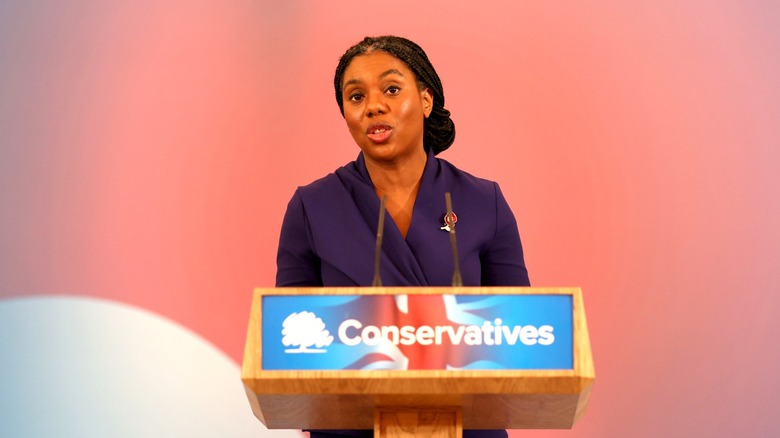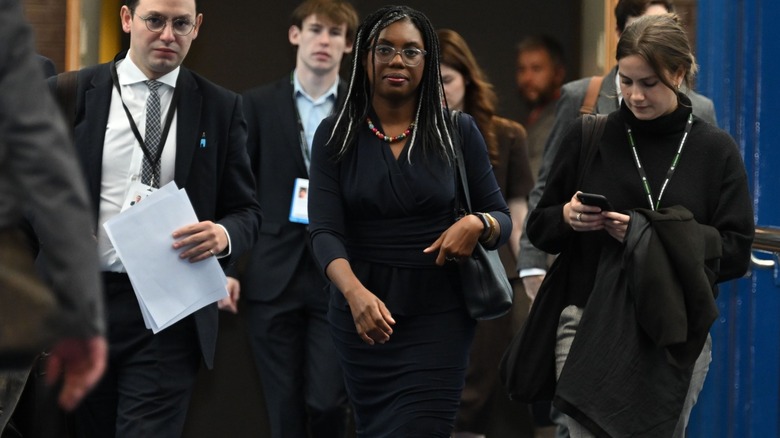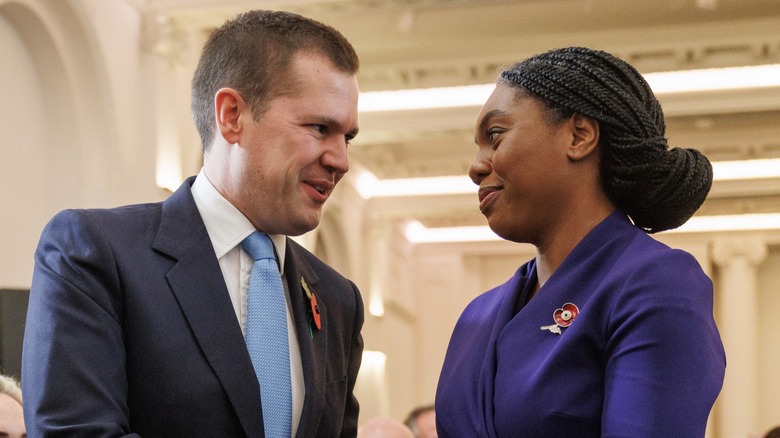Tragic Details Of Kemi Badenoch
The U.K.'s Conservative Party, also known as the Tories, do what they say they do. They are essentially the British Republicans –- emphasizing traditional values and being fiscally prudent. In 2024, the Conservatives suffered their worst election loss in history, leading to a change in leadership. Enter, Kemi Badenoch. Badenoch, who is of Nigerian descent, won just over half of the votes to lead her party in opposition to the government and became the first black female leader of any major British political party. In 2021, she even went as far as calling the U.K. "the best country in the world to be Black" (via UnHerd).
But since becoming the Conservative leader, Badenoch has wasted no time in getting embroiled in various controversies. She told Times Radio that maternity pay has "gone too far" and was "excessive" while also suggesting gruesome details about the "partygate" scandal that erupted after illegal soirees were held at 10 Downing Street during the Covid-19 lockdown were "overblown" (via the BBC). She is certainly no stranger to ruffling feathers.
In the U.K., Badenoch's official title in government is "Leader of the Opposition" because her party is opposed to the current elected government, but political rivalry is not the only tough obstacle she has faced.
Kemi Badenoch grew up with no running water or electricity
The new Tory leader, Kemi Badenoch, was born in south London in January 1980. But early in her infancy, her parents took her back to their native Nigeria, which at the time was in the midst of a military dictatorship. It was a dangerous place to be in the late '80s and early '90s, with the country getting suspended from the Commonwealth after a government-sanctioned execution of climate activists, including writer Ken Saro-Wiwa. In 2018, she told The Times, "Being middle class in Nigeria still meant having no running water or electricity, sometimes taking your own chair to school."
In the 1990s, when Badenoch was growing up in her ancestral homeland, the country's economy collapsed. This meant her father was out of work and her mother became the chief breadwinner. In her first public speech as a Member of Parliament, Badenoch referred to this difficult time in her adolescence, explaining that her family was "living without electricity and doing my homework by candlelight, because the state electricity board could not provide power, and fetching water in heavy, rusty buckets from a borehole a mile away, because the nationalized water company could not get water out of the taps" (via The Times).
Badenoch is not the only successful woman to start her life less fortunate, though: actor Viola Davis had a similarly tragic childhood. Like Davis, Badenoch harnessed the tragedy of poverty, with it having a big influence on her future in the political sphere. This experience directly shaped her pro-privatization and free-market political views, which are shared by Britain's first female Prime Minister, "The Iron Lady", Margret Thatcher — as British journalists are so fond of reminding people.
When she returned to the UK, her father gave her his last £100
Kemi Badenoch's early financial instability did not go away quickly. When speaking to The Free Press, she shared the story of how her father "gave me the equivalent of what was his last £100" when she returned to England at 16 years old, because Badenoch "really wanted to come back to the U.K. and I had a British passport so all of those experiences have shaped my view of the world. That even if you're wealthy things can disappear and you have to work very hard to maintain, not just your family, but also your country."
Growing up with financial insecurity is one thing, but then leaving your parents and all you've ever known will amplify that lack of stability tenfold. When she arrived in the U.K. Badenoch lived with family friends in south London's Morden and began studying for her A-Levels (the equivalent of an Advanced Placement (AP) exam in the U.S.). She recalled this tumultuous time in her young life in the aforementioned interview with The Times, "It was very lonely," but she also reminisced about what helped her get through this uncertain period "it was the novelty and excitement of being in the U.K. There were so many things I hadn't done before. I'd never been on a bus. And I thought London buses were so futuristic because the doors made a swish noise when you got on. It was like living in a movie."
There's no doubt that Badenoch must have been extremely strong-willed at this point in her life. The guilt associated with such financial pressure for her to succeed in the U.K. was likely enormous with her and her family's monetary well-being in her hands. It is an element of Badenoch's life that probably influenced her policies: as equalities minister, she introduced her "Inclusive Britain" policy, which had a goal of reducing inequalities between the white population and people of black and ethnic minority origin.
Kemi Badenoch underachieved in her school years, through no fault of her own
In the aforementioned interview with The Free Press, Kemi Badenoch shared her frustration at the British education system, she claimed "no one at the school had pushed [her] to fulfil [her] potential" even though in her native Nigeria she was a "straight A student". She continued, "I call it the soft bigotry of low expectations. The poverty of low ambition. Why do you want to study medicine you can do this other thing instead? Because they didn't care."
It is a situation that clearly still plays on Badenoch's mind, in the 2024 interview she even states it was a driving factor for her becoming a Conservative politician in adulthood. This lack of drive to push herself was compounded by Badenoch's precarious financial position and need to work to sustain herself, unlike most of her peers in her age group. "A lot of people in the U.K. think that it was like a summer job or something." She told The Free Press, "That was my job and then I went to a part-time college, between age 16 and 18." At such a young age, Badenoch was spinning many plates, so it's no surprise that her anger at the British education system plays such a pivotal role in her politics.
In her interview with The Times, published in February 2024, she admitted her paid work affected her grades, "I probably did too much of it, which didn't help with my A-level grades." There were many factors at play which were detrimental to Badenoch's academic success, but she did not let that stop her from continuing her education in the U.K. despite teachers who "actively encouraged me not to apply for things that I wouldn't get into."
She didn't fit in politically at her university
In the book "Blue Ambition: The Unauthorised Biography of Kemi Badenoch" (the titular blue refers to the color synonymous with the Tories), a biography written by Conservative peer Lord Michael Ashcroft, it is suggested that Badenoch became interested in politics due to the left-wing culture across her university campus. But as her interest in politics grew, Badenoch became less and less aligned with her peers and she pulled no punches when describing them to The Times, saying that the left-leaning "kids didn't know what they were talking about. And that instinctively made me think, 'These are not my people.'"
The University of Sussex, Badenoch's alma mater, is famed for its left-wing politics. With two of its alumni becoming elected as MPs for the left-leaning Labor Party at the 2024 general election – the same election the Tories lost so comprehensively — talk about rubbing salt in the wound. Unfortunately for Badenoch, the left's dominance was just as strong in the late '90s and early '00s when she was a student. In 1997, the Labor Party won over 13 million votes with their perma-rivals, the Conservatives, receiving under 10 million. Safe to say, Badenoch was not in the majority in (or outside of) her university.
In her interview with The Free Press, she described why she became a Conservative, admitting her education played a pivotal role — "it was those experiences at school, comparing them to experiences I had growing up, and the rise of identity politics then [in 2005]." The tragedy here comes from the idea that university is somewhere to meet like-minded people and form friendships for life, but Badenoch seemingly did not see eye-to-eye with her peers. This is especially tough when you remember she had only lived in the U.K. for less than four years when she attended the university.
Kemi Badenoch's supportive father passed away in 2022
In an interview on Chopper's Political Podcast, Kemi Badenoch was asked "What was the moment you looked in the mirror and said 'There looks the Prime Minister?'" Typically, a politician would answer by reeling off policy points or giving a potted summary of their CV. Not Kemi Badenoch, who told the host, Christopher Hope, that her motivations were born out of a recent tragedy. "The most significant thing, which I don't often talk about, is that my dad died. Right at the beginning of 2022."
She described his death as "the worst possible thing that could happen in my life... it felt like the foundation had been pulled away from under me." It was no doubt a shock to Badenoch and her family, but the future Conservative leader said it had an unexpected consequence, "it also meant that I became less risk averse." It was the year that Badenoch took the risk of running for the Conservative leadership, eventually losing to the U.K.'s shortest-serving, history-making Prime Minister, Liz Truss. Badenoch was knocked out in the fourth round (of six) in July 2022. It was her second shock of the year, but a much nicer one, as she surprised the media and Conservatives alike by beating more experienced MPs like Grant Snapps and Sajid Javid.
Badenoch confirmed the result didn't faze when she spoke to Hope in 2024, "then it wasn't really about becoming prime minister, it was about being listened to." When Rishi Sunak took the reigns from Truss after her 45-day premiership, Badenoch was named as Secretary of State for Business and Trade. As the saying goes, it's always darkest before the dawn.
Kemi Badenoch received death threats after the publication of a former Tory MP's book
On November 9th, 2023, the former Conservative MP Nadine Dorries released a scathing book about the then-failing Tory party named "The Plot: The Political Assassination of Boris Johnson." In the book, Dorries accuses Kemi Badenoch of helping to orchestrate the plot to oust former Prime Minister Boris Johnson from leadership. Allegedly, this plot was the reason Johnson, who threatened Donald Trump's title of worst hair, resigned in September 2022. In a post on X (formerly Twitter), Dorries added clarity to the accusations she leveled at Badenoch. "Kemi didn't need the help. She knew, whoever won, Rishi or Liz, they were just the caretaker until her closest friend, Dougie Smith and mentor and the rest of the plotters were ready to pop her into place."
On February 9th, 2024, Badenoch spoke out about death threats she'd received as a result of the book's publication. Whilst being interviewed by The Times, Badenoch spoke about the mob mentality that turned her way, "She [Dorries] thinks she's just writing stuff, but people who have that kind of mindset latch on to it. If you get the unhelpful coalition of mental health issues and propensity to violence, then you read the Nadine Dorries conspiracy theory and decide you want to kill someone, it's very, very nasty." It was likely an incredibly frightening time for Badenoch. But Dorries' book was just the tip of the iceberg for the vicious attacks Badenoch would face.
She claims that she was targeted by a smear campaign
Politics is a vicious, Machiavellian world. It often feels like we are living in an episode of "Veep", but a less funny version. Well, politics is not so different across the pond, with Kemi Badenoch falling victim to dastardly maneuvering ahead of her ultimately successful bid for the Conservative leadership. It was a smear campaign fought on two fronts. Firstly, the smearers attempted to dredge up some dubious demons from Badenoch's past, taking the form of an online profile under the name "Kemi," which spouted controversial comments. Next, Badenoch was accused of bullying; it was suggested she cultivated a "toxic" atmosphere in the business department in her role as Trade and Business Secretary, so much so that her former employees felt they had no other option but to leave their roles.
Badenoch had worked her whole life to get to the top of U.K. politics, fighting through the turmoil of a military dictatorship in Nigeria and being a political outcast at university. To have unproven allegations thrown her way at the most pivotal juncture of her political career is devastating. Badenoch robustly denied the accusations in an update on X, saying "these allegations are smears from former staff who I sacked after they were accused of bullying behavior, lying about other colleagues to cover up their own failures and general gross incompetence. Intolerable behaviour I would not stand for."
Unfortunately, such accusations seem to be a dime a dozen in the British political sphere, with fellow Tory Dominic Raab and former Speaker of the House of Commons John Bercow having had similar claims levelled at them. Such unsubstantiated accusations can lead to anxiety, depression, and even post-traumatic stress disorder (PTSD), whilst also damaging the reputation of the accused. Indeed, Badenoch's career was put in a precarious position because of such claims. She was able to bounce back, though, but that didn't put an end to her tragedy.
Kemi Badenoch won the leadership of the Conservative party at the most difficult time in their history
After the U.K.'s 2024 General Election, the Conservatives witnessed their share of the votes plummet by 20%. Kemi Badenoch had a lot on her plate to get the party back to its former glory. There's a tragedy in achieving big in her career at the wrong time. In her speech after winning leadership, beating out Robert Jenrick, Badenoch was realistic about the task in front of her. "Our party is critical to the success of our country, but to be heard, we have to be honest. Honest about the fact that we made mistakes, honest about the fact that we let standards slip. The time has come to tell the truth" (via the Guardian).
The universe works in mysterious ways and Badenoch suffered from being in the right place at the wrong time. The Conservatives had just spent 14 years ruling the U.K. and went through an unprecedented five leaders between 2010 and 2024. It's one of those situations where you just have to say, "That's life." But it's one thing to become the leader when your party is in government, it's another when have just gained the fewest seats in their history and questions are being asked about whether it is still a relevant political force because of the rise of rival party Reform U.K.
Badenoch became the leader of her party at the most difficult time in its history, and it will be a long road for her to bring it back to its former glory. She told BBC Radio 4 about her plan to turn this point in Conservative history from a tragedy to the start of a redemption arc. "I do the thinking and what people are going to get with new leadership under me is thoughtful Conservatism, not knee-jerk analysis." But with Trump's billionaire BFF, Elon Musk keen to invest in her rivals, there will be no rest for the wicked,or the good, depending on which side you favor politically.








